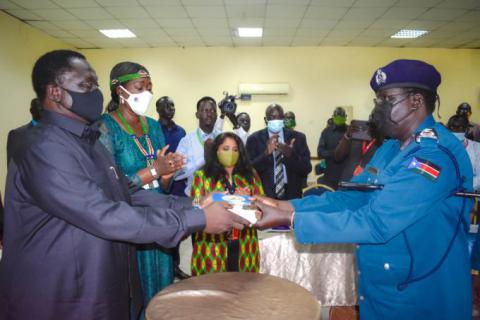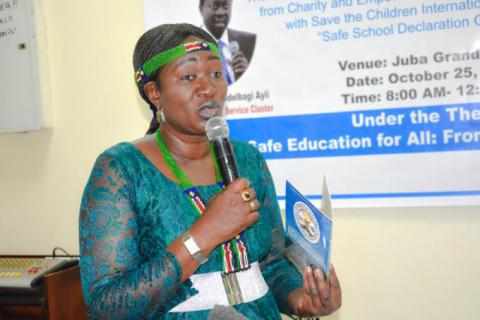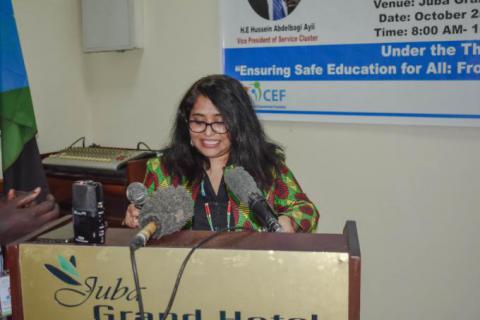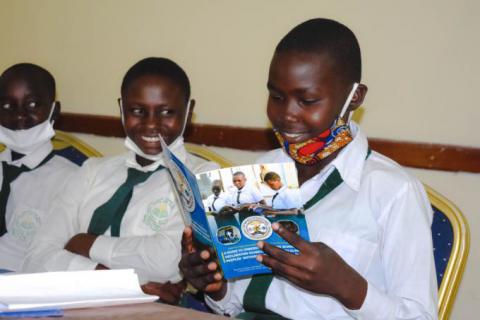South Sudan launches ‘Safe School Declaration Guidelines’ with support from Save the Children to protect schools from military use
25th October 2021, Juba - Save the Children Country Director, Rama Hansraj, (middle) successfully handed over “Safe School Declaration Guidelines” to South Sudan government authorities. H.E Vice President of Service Cluster, Hussein Abdelbagi Akol (left forward) and Hon. Minister of General Education and Instruction Hon. Awut Deng Achuil received the guideline to enable authorities safeguard schools in South Sudan. Photo: Ezibon Saadalla/Save the Children.

"To save education, we need to stop the violence, allocate enough budget for education, provide free learning materials, expand adult education and allow all children to complete at least free primary and secondary education."
This was the message delivered to the government and armed groups by school children during the official launch of the 'Safe School Declaration' guideline in Juba on Monday 25, 2021. The guidelines are meant to protect schools from military use during and after armed conflicts
The crisis in South Sudan has impeded education for most of the country’s children. Schools across the country were frequently closed due to fighting and the threat of violence, and hundreds of schools and other civilian assets were looted and destroyed.
It is estimated that 72% of children are out of school at the primary level and that 76% of girls are out of school – the highest rate globally. In the lower secondary level, it is reported that 60% of children are denied access to education which accounts for the second-highest rate in the World.
Since the beginning of the conflict to date, 293 incidents of attacks on schools or protected persons or of military use of schools were reported across the country. These incidents cumulatively affected more than 90,000 children.
Safe School concept
The Safe Schools Declaration is, therefore, an inter-governmental political commitment that provides countries the opportunity to express support for protecting students, teachers, schools, and universities from attack during times of armed conflict; the importance of the continuation of education during armed conflict; and the implementation of concrete measures to deter the military use of schools
The Ministry of General Education and Instruction, and Charity and Empowerment Foundation (CEF), with support from Save the Children International developed the guidelines to facilitate the dissemination of the guidelines of the Declaration incorporated into the South Sudan People Defense Forces (SSPDF) code of conduct
The Norwegian Agency for Development Cooperation (NORAD) provided the funding.
Guidelines
The printed guidelines offer direction on concrete measures that armed forces and non-state actors can take to avoid military use of educational facilities, to reduce the risks of attacks, and to mitigate the impact of attacks and military use when they occur.
Charity and Empowerment Foundation with support from Save the Children invited stakeholders for the official launch of the 'Safe Schools Declaration Guidelines' for South Sudan on Monday.
The event was graced by the Vice President in charge of Service Cluster, Abdelbagi Ayii and the Minister of General Education and Instruction, Awut Deng.
It was also attended by the Undersecretary in the Ministry of Defense, the Deputy Inspector General of Police, students and representatives of the UN agencies, among others.
"We are here to declare our commitment to practice the safe school declaration," said Vice President Ayii after handing over copies of the guidelines.
The booklets were handed over to the Undersecretary in the Ministry of Defense, Major General Chol Diar Ngang and the Deputy Inspector General of Police Lieutenant-General James Pui Yak Yiel. Copies were also given to the Ministry of Justice.
"It is important to evacuate any premises and institution of learning occupied by armed groups to be evacuated now and not tomorrow," His Excellency Ayii directed.
The Declaration is expected to also protect students, teachers, schools, and other learning institutions from some of the worst effects of armed conflicts.
"This is a milestone in safeguarding our school children and learning institutions. Allowing learning to take place and protection of children during learning in South Sudan is [paramount]," VP Ayii asserted.
The Vice President further encouraged stakeholders to embark on awareness and action campaigns to promote the protection of schools and other learning institutions in South Sudan.
The handover was also officiated by Minister Awut Deng and Save the Children's Country Director, Rama Hansraj.
Although South Sudan endorsed the Safe School Declaration in 2015, it has not been able to implement the guidelines fully and conduct the assessments due to lack of funds. However, stakeholders including the government representatives were briefed. South Sudan had the first conference on Safe School Declaration (co-convenience meeting)
During a validation workshop of the Safe Declaration guidelines, representatives of armed forces and civilians were identified to be occupants of the schools in South Sudan.
The Minister of General Education and Instructions, Awut Deng Achuil reaffirmed her commitment to protecting schools and protecting children.

Hon. Awut Deng Achuil, Minister of General Education and Instructions. Photo: Ezibon Saadalla/Save the Children
She called for wider collaborations among actors to create a conducive environment for learning in South Sudan.
"To ensure what is in the book is understood and put into practice for the sake of our children, dedicated individuals must be tasked to disseminate the guidelines [and] communities need to be included in the safe school campaigns because, during floods, schools are often occupied by the affected communities," she stressed.
According to the Global Coalition to Protect Education from attack, population displacement, continued abduction of children & women, COVID-19 restrictions and mandatory closure of schools for fourteen (14) months had further threatened education in South Sudan. But the countrywide reopening of schools in May 2021 is an opportunity to secure the future of children in South Sudan.
The Safe School Declaration has been developed in the form of Schools as "Zones of Peace."
Furthermore, South Sudan Ministry of Education policy framework has been developed and is now before the cabinet for approval. This document is inclusive of peacebuilding education, life skills, citizenship in the curriculum.
In her remarks, Save the Children's Country Director, Rama Hansraj said there is a need for strong participation of the government to enforce the document.

Rama Hansraj, Country Director, Save the Children South Sudan: Photo: Ezibon Sadalla/Save the Children
She outlined activities that would curtail the disruption of learning during times of armed conflicts such as "risk-mapping, risk-reduction plans, the formation and training of children’s clubs, community outreach, and legal reviews."
Since most of those occupying the schools are armed forces, the Ministry of Defense as a key stakeholder was encouraged to commit themselves to the document.
On April 21, 2021, Save the Children in collaboration with national partner CEF lobbied the Ministry of Defense and Veteran Affairs to “express political commitment to advance the principles of safe school declaration by unconditionally prohibiting the military from occupying schools
"There is a need to domesticate the Safe School Declaration," Rama said. "This will require an inclusive process -after all, the inequalities in education based on gender, culture, inequitable resource sharing is the root cause of conflict."
During the launch of the guidelines, the Undersecretary – Ministry of Defense and Veterans Affairs read their commitment to the document as written by the Minister of Defense, Angelina Teny
"We shall ensure the concerned units within Ministry of Defense are instructed to start the process of observing the safe school guidelines," Major General Chol Diar Ngang pledged
He also acknowledged the importance of monitoring and reporting grave violations against children in armed conflicts as per the UN Security Council resolution.
UN Security Council resolution
In 2005, the Security Council established a Monitoring and Reporting Mechanism (MRM) to systematically monitor, document and report on violations committed against children in situations of concern around the world.
On September 1, 2021, the Minister of Defense and Veterans Affairs, Angelina Teny - in response to the letter written to her by Save the Children and CEF - ordered all military personnel and other armed groups to peacefully vacate all schools and other learning institutions currently under occupation to allow safe learning environment for children.
“Occupying school is a thing of the past. All military members are unconditionally prohibited from occupying schools, interfering with, or disrupting school classes or activities, or using school facilities for any purpose," Angelina said in her directives
Major General Chol Diar disclosed at today's function that such orders have already been issued for schools recently occupied by armed groups -especially in Western Equatoria state to be vacated and the forces organized.
"There is an existing order for all schools still occupied by armed groups to be vacated immediately."
To better monitor, prevent, and end these attacks, the United Nations Security Council has identified and condemned six grave violations against children in times of war: Killing and maiming of children; recruitment or use of children in armed forces and armed groups; attacks on schools or hospitals; rape or other grave sexual violence; abduction of children; and denial of humanitarian access for children.
South Sudan Deputy Inspector General of Police, who also represented the Minister of Interior at the launch of the document described it as a "great document if implemented."
"It is important for us the organized forces to disseminate the booklet," said Lieutenant-General James Pui Yak Yiel
He added that "we are committed to distributing this document and enforcing it within the armed forces since we are also the law enforcers."
UNICEF representative described the launch as “a great day for global advocacy initiative to ensure safe space for safe learning.”
Way forward

Girls read Safe School Declaration Guideline during the handover ceremony in Juba. Photo: Ezibon Saadalla/Save the Children
Save the Children, partners and the Minister of Defense and Veteran Affairs express commitment to keep schools safe and urged all parties to the “armed conflict to refrain from actions that impede children’s access to education”.
To build forward better, Save the Children and partners ensure equal opportunities for learners as COVID-19 restrictions are relaxed and normalcy resumes includes COVID-19 recovery for children, safe learning at education centers, scaling up and adapting financing which calls for “urgent filling of the education [financing] gaps,” and focusing on equity and child participation.
“A joint assessment on the out-of-school children should be conducted involving all stakeholders including civil society. This should lead to a robust plan for ensuring all children receive a quality education,” Rama Hansraj underscored.
Meanwhile, the Executive Director of CEF, Chol Gai appreciated the Ministry of Defense, Interior and partners for committing to the document. He also commended Save the Children for working with local organizations to ensure hardest reached locations are accessed. He said the partnership “reduced bureaucracy and improved service delivery.”
“Our task is to inform people about the dangers of occupying civilian facilities,” Gai said.
In conclusion, Save the Children’s Country Director called for an increase in “funding for peace education and the implementation of the Safe School Declaration guidelines.”
Written by Daniel Danis/Save the Children
 South Sudan
South Sudan